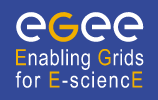Speaker
Describe the added value of the Grid for the scientific/technical activity you (plan to) do on the Grid. This should include the scale of the activity and of the potential user community and the relevance for other scientific or business applications
The DILIGENT vision has been put in place with the implementation of gCube. The gCube software reflects the three-dimensional Grid vision of resources sharing (computation resources, data/information and application services), and implements a SOA over a Grid middleware. gCube adopts the WS-Resource Framework, WS-Addressing, WS-Notification, and WS-Security set of conventions and relies on the EGEE project middleware (gLite) and infrastructure. By merging a service oriented approach with Grid technology, gCube exploits the advantages of both.
The demand for DL has steadily increased during the last years. Distributed communities and organizations, regardless domain, need to share their multi-type data and information, collaborate and produce knowledge by processing data, in a secure and efficient manner. DILIGENT provides an infrastructure that addresses these scenarios providing Virtual Research Environments (VRE) to these communities.
Describe the scientific/technical community and the scientific/technical activity using (planning to use) the EGEE infrastructure. A high-level description is needed (neither a detailed specialist report nor a list of references).
The DILIGENT project (http://www.diligentproject.org) provides an infrastructure for supporting the creation of on-demand, transient Digital Libraries (DL). It relies on the EGEE middleware and infrastructure to deliver advanced DLs functionality to two user communities: ImpECt from the environmental e-science domain and ARTE from the cultural heritage domain.
Report on the experience (or the proposed activity). It would be very important to mention key services which are essential for the success of your activity on the EGEE infrastructure.
The gCube system offers a wide range of DL services. Some of these services, due to their characteristics, are specially tailored to be executed in a computing infrastructure as the one provided by EGEE. Several DILIGENT applications like watermarking, feature extraction and image processing can largely profit from the distributed computation handled by gLite. One concrete example is the currently ongoing experimentation with feature extraction on images. This experimentation started in the third week of July and was able to process so far around 25 million images, something completely impossible without the exploitation of the EGEE PPS infrastructure.
Abstracts for online demonstrations must provide a summary of the demo content. Places for demos are limited and this summary will be used as part of the selection procedure. Please include the visual impact of the demo and highlight any specific requirements (e.g. network connection). In general, a successful demo is expected to have some supporting material (poster) and be capable of running on a single screen or projector.
The proposed demonstration will illustrate the DILIGENT infrastructure and the capabilities behind its configuration and management. This includes the creation, monitoring and management of VREs and the users and resources (computers, services, running instances, collections, gLite resources, etc.) associated to it.
Several implemented gCube DL services will be demonstrated. It will be explained how these novel functionality for autonomic management, controlled sharing, storage, indexing, etc., has been developed by exploiting the WS-*/WSRF specifications, the gLite middleware and the EGEE infrastructure.
From the DILIGENT user communities point of view, the functionality will be exemplified by demonstrating two VRE: one to support courses and teaching activities in the culture-heritage domain and another to support the automatic generation of reports in the environmental sector. This will highlight the added value of the DL services being exploited.
